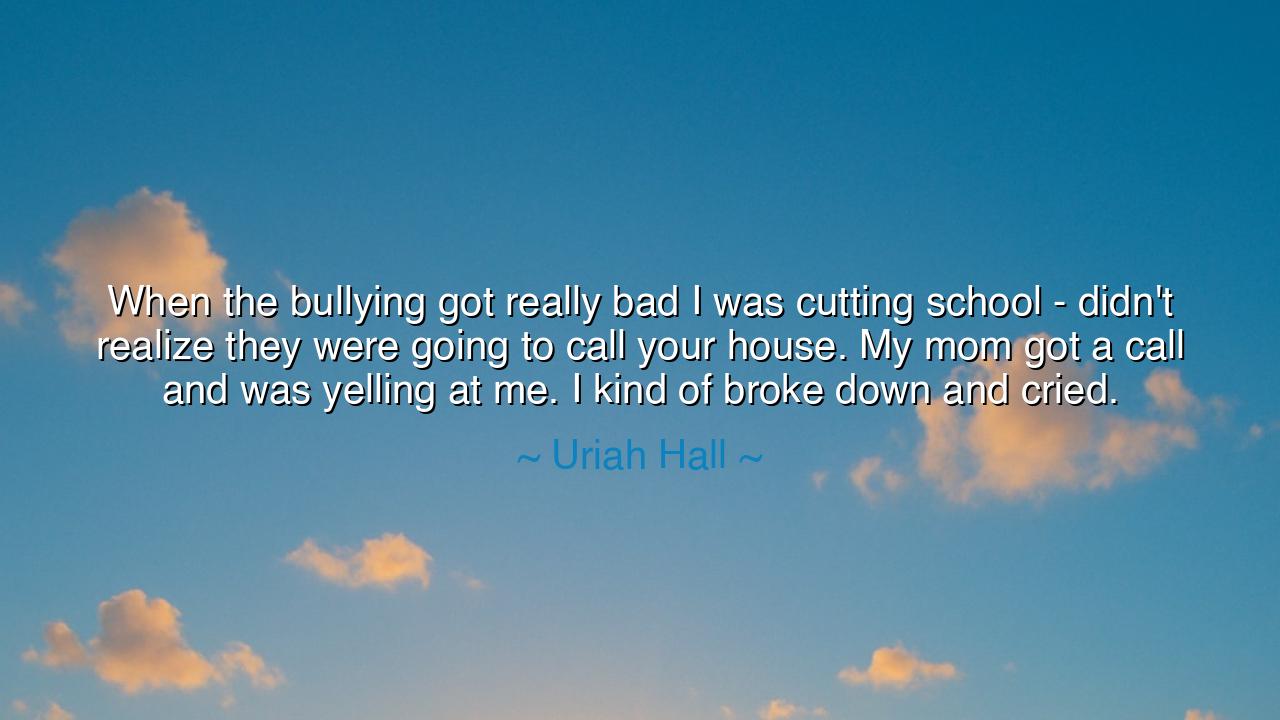
When the bullying got really bad I was cutting school - didn't
When the bullying got really bad I was cutting school - didn't realize they were going to call your house. My mom got a call and was yelling at me. I kind of broke down and cried.






Uriah Hall, warrior of the fighting ring yet once a child wounded by the cruelty of others, spoke these words of remembrance: “When the bullying got really bad I was cutting school—didn’t realize they were going to call your house. My mom got a call and was yelling at me. I kind of broke down and cried.” What seems at first a story of weakness is in truth the seed of resilience, for in this confession lies the universal human struggle: the pain of rejection, the desire to escape, and the breaking point that precedes transformation.
The ancients knew well the scourge of cruelty among peers. Even in the agora of Athens or the training grounds of Sparta, the young mocked the weak, and the different were cast aside. Yet history has also shown that those who endure humiliation often rise with strength unknown to those who never tasted it. Hall’s words echo the eternal story of the soul tested by suffering, broken in its youth, but refined into iron by fire.
The image of cutting school reveals the instinct of escape. When pain becomes too great, the human heart seeks refuge. In ancient tales, many heroes also fled before they found their calling. Moses fled Egypt after killing a taskmaster, only to return years later to free his people. Aeneas, after the fall of Troy, carried his father on his back and sought a new destiny in exile. To run from torment does not mean cowardice—it is often the beginning of the journey that teaches endurance.
Yet escape has its price. The call from the mother’s house reminds us that our choices ripple outward. The child who skips school in silence cannot remain hidden; the truth, like smoke, rises and reveals itself. Hall’s memory of his mother yelling is not merely about anger—it is the voice of a parent who sees her child slipping away, who fears for his future, and who must raise her voice to awaken him. Her words, though harsh, were born of love, and in that moment of conflict, the boy broke down and revealed his pain.
This breaking down, this moment of crying, is not defeat—it is revelation. For tears are the water that softens the soil before new seeds can grow. The boy who weeps in his mother’s presence is no longer hiding. His suffering is laid bare, and from such truth healing can begin. Many in history have wept before they rose. Abraham Lincoln, mocked and belittled in his early career, wrote of sinking into despair so deep he thought never to rise. Yet from such sorrow came the steel that led a nation.
The wisdom here is profound: what breaks you can also shape you. The pain of bullying, the shame of exposure, the sting of a parent’s anger—all these can become the forge in which courage is formed. Uriah Hall’s later life, rising as a fighter who harnessed discipline and fury, shows that tears of youth can be transmuted into triumph of manhood. The same is true for all who endure cruelty—what seems like weakness today can become the very strength that carries you forward.
Therefore, let us learn from these words. Do not despise your moments of breaking down, for they are proof you are still alive, still feeling, still human. Seek not only escape but transformation. Parents, listen closely to the hidden cries of your children, for behind rebellion may lie silent suffering. And all who face the darkness of ridicule, remember this: the pain you bear may yet be turned into power, if you refuse to let it define you.
For in the end, the teaching is clear: suffering, though bitter, is not the end. It is the beginning of resilience. And the boy who once cried because of cruelty may rise to inspire others, showing that no wound is wasted when it is met with courage.






AAdministratorAdministrator
Welcome, honored guests. Please leave a comment, we will respond soon